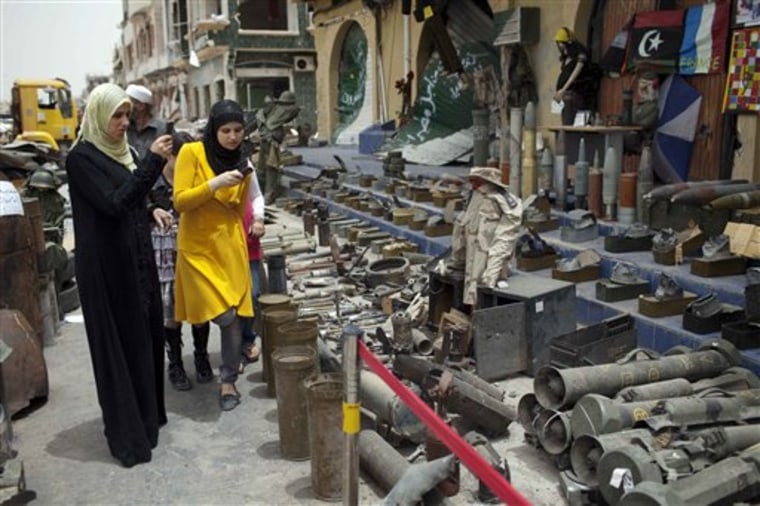In a boost to Libya's rebels, the European Union opened a diplomatic office Sunday in their eastern stronghold and pledged support for a democratic Libya where Moammar Gadhafi "will not be in the picture."
The office in the de facto rebel capital of Benghazi gives Gadhafi's opponents a key point of contact with the 27 nations in the European bloc and adds to the growing international recognition of the rebels' political leadership.
In return, the head of the rebels' National Transitional Council held out the possibility of future rewards for those who offer early support, and he said his nascent administration would respect human rights and international law.
"The United States and the European Union should know that we are a righteous people," said Mustafa Abdul-Jalil. "We are fighting for a better future and they will not regret helping us."
The rebel-held east is home to most of Libya's oil resources, and Abdul-Jalil said backers of the rebel council could stand to benefit in future business deals.
"Our friends who support this revolution will have the best opportunity in future contracts in Libya," he said.
A number of other countries — including France, Italy, Qatar and the West African nation of Gambia — have already recognized the rebels, while the United States and other countries have sent envoys to open talks.
EU foreign policy chief Catherine Ashton opened the bloc's office in Benghazi's heavily guarded Tibesti Hotel, saying she looked forward to a better Libya "where Gadhafi will not be in the picture."
"I have seen the vision of the Libyan people today all around. I saw the posters as I came from the airport with the words 'We have a dream,'" she said after meeting with Abdul-Jalil.
In a statement released by her office in Brussels, Ashton said she found that the rebel leaders "have great aspirations for the people of this country and they have the leadership qualities and skills necessary to take the country forward."
She said she discussed EU support in border management, security reform, the economy, health, education and in building civil society.
Stalemate
Ashton did not offer what the rebels say they need most — heavy weapons to match the arsenal of Gadhafi, Libya's leader of more than 40 years, who controls the capital, Tripoli, and most of western Libya.
Gadhafi has responded to the uprising that began in mid-February by unleashing his military and militias against the rebels, who have been aided by NATO bombing runs aimed at maintaining a no-fly zone and at keeping Gadhafi from attacking civilians.
The two sides have been stalemated in recent weeks, with the rebels complaining they cannot defeat Gadhafi's better-equipped army. But no country has agreed to send arms.
Rebel forces were able to hold off an advance Sunday by Gadhafi's forces toward a key rebel-held border crossing with Tunisia, a resident of the area said.
The Wazin crossing is an essential lifeline for rebels in Libya's western mountains, allowing them to get food and medical supplies from Tunisia. It has been under frequent attack for weeks, said the resident, who gave only his last name, Jaber, because he feared retribution from Gadhafi's troops.
He said the government troops attacked rebel forces from on top of a nearby mountain before dawn. Two hours of clashes killed one rebel fighter and 15 government troops, he said.
Most EU nations have frozen their relations with Gadhafi's government and withdrawn their diplomats. Hungary, which holds the bloc's rotating presidency, is the only member nation still maintaining a diplomatic mission in Tripoli.
The opening of the diplomatic office came as NATO widened its campaign to weaken Gadhafi's regime with airstrikes on desert command centers and sea patrols to intercept ships.
NATO on Sunday said in Brussels that its aircraft flew 49 strike missions on Saturday. They hit a command-and-control facility near Tripoli, as well as ammunition dumps, air defense radars, and a tank and truck near a rebel-held town in the mountains south of Tripoli.
More NATO raids
Early Sunday, NATO raids again targeted the sprawling, heavily fortified Gadhafi compound in the capital, said government spokesman Ibrahim Uthman. The spokesman earlier said a NATO strike hit the port but later said that information was incorrect.
Uthman said the strike wounded five people. He said it was aimed at an old administrative building in the sprawling Gadhafi compound.
Reporters, who cannot move about freely in Tripoli and must be accompanied by government minders, were not taken to see the compound after the bombing.
In overnight fighting southwest of Benghazi, two rebels were killed and 12 wounded in a firefight with Gadhafi forces at New Brega, a residential area outside the oil town of Brega, Dr. Suleiman Refadi told the AP.
Refadi, a surgeon who volunteers on the front line, said Gadhafi's fighters suffered deaths and injuries but he could not say how many. He said the rebels had attacked from six directions in a bid to outflank the enemy.
They destroyed two vehicles mounted with heavy weapons and captured three, Refadi said.
Brega has changed hands several times since the revolt against Gadhafi began three months ago.
